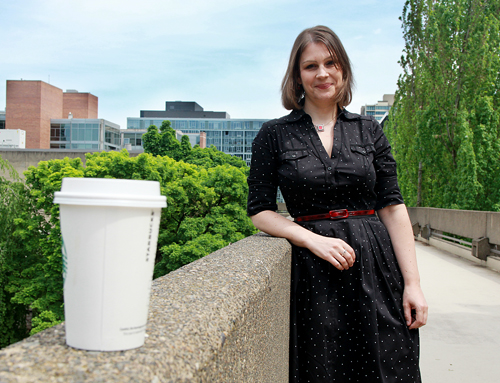Imagine working an eight-hour shift and having various short periods of down time. People might think to get a coffee or check Facebook, but according to research conducted by Portland State psychology Professor Charlotte Fritz, these “microbreaks” are actually unproductive.
What, no coffee break?

Imagine working an eight-hour shift and having various short periods of down time. People might think to get a coffee or check Facebook, but according to research conducted by Portland State psychology Professor Charlotte Fritz, these “microbreaks” are actually unproductive.
Fritz said that her research is about occupational health and about work-life balance. She started with looking at the question of how people unwind from work stress outside of work. She went down the scale from vacations to weekends, to evenings and lunch breaks, and finally to what she calls microbreaks.
To gather research, Fritz goes to several different workplaces,ranging from software companies to kindergarten classrooms, and asks employees to fill out surveys regarding their well being, their self-performance productivity, and to answer questions like: What are your experiences during work-breaks?
“Generally we find that work-breaks are a good thing, especially finding time to unwind from work stress,” Fritz said. Things she noted were going on vacations, and weekends and evenings at home.
“One big factor that we find, we call psychological detachment. And what that is, is mentally disengaging from work—not just leaving the office, but also not thinking about work. Not checking your emails at home, not having a Blackberry with you and being on-call, so really getting away from work mentally,” Fritz said. “We find that it’s definitely beneficial for people’s well being.”
For some that may not be at all surprising. But the next part of Fritz’s research is. In the microbreak study, Fritz and her colleagues looked at two types of microbreaks: those that are work-related, and those that aren’t.
Fritz provided examples of things that are related to work: thanking a co-worker, getting feedback, or learning something new; and non-work related: surfing the Internet, going shopping, stepping outside for some fresh air or getting a coffee.
She said that for non-work related microbreaks, some negatively affected workers by bringing down their energy levels. Some weren’t negative but also weren’t positive.
“But we did find that work-related microbreaks can be related to a sense of feeling energized and feeling less fatigued, and those things that people do to feel more energized seemed to be in three categories,” Fritz said.
Those three categories were learning, relationships and meaning. “Learning something new and broadening your horizon, creating social networks and building high quality relationships with people. Thinking about how you contribute and do something meaningful at work,” Fritz said.
In a recent interview with Harvard Business Review, Fritz was asked to defend her research. The interviewer told Fritz, “It just seems so implausible that a walk outside during the day wouldn’t improve your energy.”
Fritz’s response: “Yes, it does seem counterintuitive.”
“Still, going outside for fresh air during microbreaks showed no statistical relationship to vitality and fatigue levels. Helping a coworker did, though,” Fritz said in the interview. “The idea seems to be that when you’re in the middle of work, you’ll do better and feel better if you focus just on work.”
Fritz said that prior to the research on microbreaks, she thought that the results would be the opposite: that non-related work breaks would be beneficial. So even she was surprised by these findings.
But others don’t find it too off base. PSU electrical engineering freshman Andrew Miles said that the findings made sense.
“I worked at a paint store, and my co-workers would take a break every hour to go smoke. And on the days that we were really busy and they couldn’t, they worked a lot better. But on the days they got to take a break every hour, they seemed a lot more tired,” Miles said.
Miles said that this term, he actually deactivated his Facebook, because he realized he was checking it almost every five minutes. He said that for him, the most effective breaks come when he realizes that he’s not being productive anymore, so he just takes a break for a bit.
He said that not using Facebook only kind of made him more productive. But in the case of a big project he has coming up it seemed quite beneficial.
“Yesterday, I spent six or seven hours working on my project, and I never once opened my laptop. I didn’t even check my phone for that matter,” Miles said. By just staying focused on his project, Miles was able to stay energized long enough to get a solid chunk of work done on his project.
For some, the idea that coffee breaks are unproductive might seem bewildering. Fritz said she believed it was due to the fact that the caffeine from the coffee may be energizing at first, for a short period of time, but eventually that will crash, again causing people to feel more fatigued and less energized.
“I’m not saying you shouldn’t take breaks. I’m just saying those microbreaks might not be that helpful. However, when we look at lunch breaks, we do find that they have positive effects for well being and lesser fatigue in general. And also, the experience during a lunch break can be beneficial.”
To read the Harvard Business Review interview, go to hbr.org/2012/05/coffee-breaks-dont-boost-productivity-after-all/ar/1.







Yeah, let’s cut down on those time-wasting bathroom breaks too, while we’re at it.